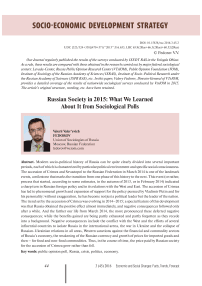Russian society in 2015: what we learned about IT from sociological polls
Автор: Fedorov Valerii Valerevich
Журнал: Economic and Social Changes: Facts, Trends, Forecast @volnc-esc-en
Рубрика: Socio-economic development strategy
Статья в выпуске: 3 (45) т.9, 2016 года.
Бесплатный доступ
Modern socio-political history of Russia can be quite clearly divided into several important periods, each of which is characterized by particular political environment and specific social consciousness. The accession of Crimea and Sevastopol to the Russian Federation in March 2014 is one of the landmark events, a milestone that marks the transition from one phase of this history to the next. This event (or rather, process that started, according to some estimates, in the autumn of 2013, or in February 2014) indicated a sharp turn in Russian foreign policy and in its relations with the West and East. The accession of Crimea has led to phenomenal growth and expansion of support for the policy pursued by Vladimir Putin and for his personality: without exaggeration, he has become not just a political leader but the leader of the nation. The trend set by the accession of Crimea was evolving in 2014-2015; a special feature of this development was that Russia obtained the positive effect almost immediately, and negative consequences followed only after a while...
Public opinion poll, Russia, crisis, politics, economy
Короткий адрес: https://sciup.org/147223845
IDR: 147223845 | УДК: [323/324+338](470+571)''2015'':316.653 | DOI: 10.15838/esc.2016.3.45.2
Текст научной статьи Russian society in 2015: what we learned about IT from sociological polls
The world oil market crisis that began in the autumn of 2014 was an additional and very heavy blow for Russia; it was followed by a slowdown of China’s economy, which resulted in a dramatic worldwide decline in the price of raw materials – from metals to coal. The entire 2015 was marked by crisis phenomena affecting virtually all raw materials extracting countries, among which Russia found itself in a particularly grave situation (in 2015, our country has lost 3.7% of GDP vs its 0.6% growth in 2014).
The main intrigue of the year in this regard was the question how stable Vladimir Putin’s regime would remain. His policy has recently received such a powerful “Crimean” impetus for its strengthening in a situation of economic crisis, falling incomes, high inflation, and decline in the standard of living. And all this has been going on against the background of the lingering conflict with the West and low economic efficiency of the Kremlin’s policy pursuing the development of cooperation with the East. The level of prices, the exchange rate of the ruble and the price of a barrel of oil – these are telling indicators, the dramatic dynamics of which electrified social atmosphere in 2015. They shifted the value priorities of the Russians, reduced sensitivity to the global role and mission of our country, and made people think more about their incomes, jobs, prices etc.
Taking into account State Duma elections scheduled for September 2016, “the ruling party” is now forced to reconsider their ideology and rhetoric and adapt them to a rapidly deteriorating geopolitical and socio-economic environment. On the contrary, the opposition had an opportunity to use the crisis to strengthen their position before the election and move away from showing too openly their support of Putin’s policy, at least in domestic affairs.
In this article we will consider the results of several public opinion polls conducted by VTsIOM using the all-Russian representative sample in 2015 to understand how the ideas of the Russians on topical issues evolved, how their political attitudes and preferences changed, how the Russians responded to the main challenges and threats of the past year and how it has affected and may affect the political course of the Russian leadership.
Social well-being
The Russians entered the new year of 2015 with mixed emotions; then, after twelve months, the polls clearly showed a decline in almost all aspects of social wellbeing. For instance, general satisfaction with life in the course of the year fell from 66 to 52 points, assessment of people’s own financial situation – from 68 to 52 points, and the index of social optimism – from 53 to 40 points. This means that indicators characterizing private lives of the Russians for the year went down in average by 13– 16 points.
An approximately similar decline is observed in indicators describing people’s perceptions of the situation in the country as a whole, but we must bear in mind that by the beginning of 2015 they have already lagged considerably behind the others. The index of assessments of the economic situation in the country decreased from 46 to 33 points, the index of assessments of the
SOCIAL FEELING INDICES
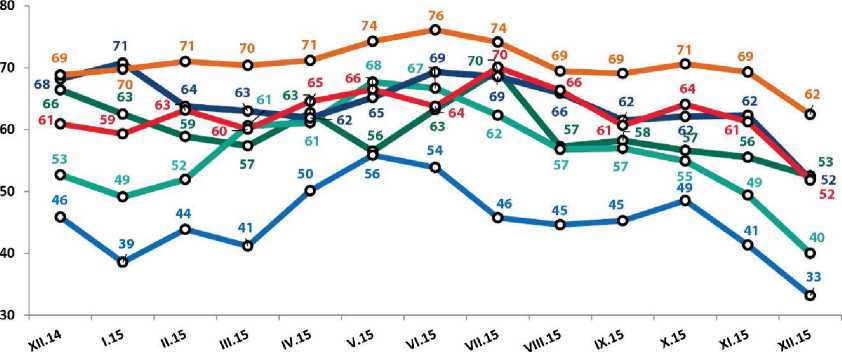
Life satisfaction index «О» Index of social optimism
Index of self-assessments of financial position -о Index of assessments of economic situation in the country о Index of assessments of political situation in the country Index of the country’s general development vector
political situation – from 61 to 52 points, the index of correctness of the general direction of development of the country – from 69 to 62 points.
As we can see, social well-being of the Russians in 2015 deteriorated significantly, but this obvious conclusion requires two important points to be clarified. First, even after they decreased, most indicators remain at historically high levels and there is still a significant margin of safety compared to the mid-2000s. Second, we do not see the picture of successive decline in all indicators throughout the year – on the contrary, from January to May inclusive, we observe an upward trend; and only in the summer, when hopes for the end of the crisis were not confirmed by economic reality, the growth stopped. The main decline was in the period from August to December, which correlates well with two processes: a new round of the global oil crisis (and a new round of weakening of the ruble) and direct entry of Russia in the Syrian conflict (whereas in early 2015 the “Minsk-2” agreement raised hopes for peace in the Donbass and thereby had a positive impact on social feeling of the Russians).
Economy and life
The year 2015 started with great hopes for economic stability and end of the war in Ukraine, but it resulted in big disappointment – because of a new war and a new wave of the crisis. Let us examine individual components of this disappointment and begin with the material factor. It was not the most important in the deterioration of social well-being of the Russians (in this capacity, economic crisis competes with the fears generated by military threat), but it has
9 What group of the population do you think you belong to? (Closed-ended question, one answer)
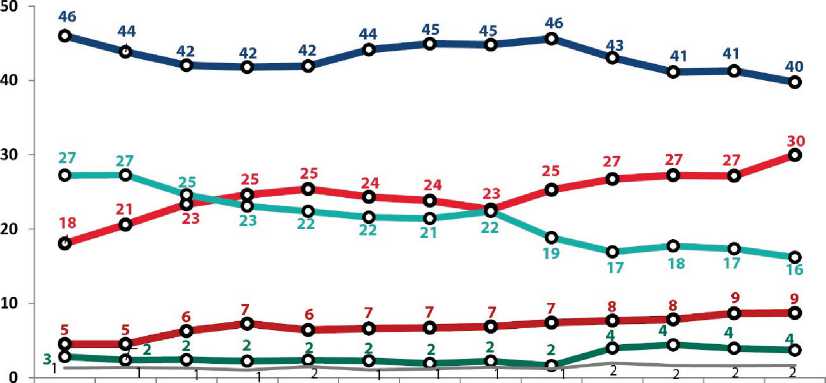
^ V» \\^ х^^ хч^ м>ъ ^ ^ ^ ^.^ ^ ^ ^
We barely make ends meet. We do not have enough money even to buy food
We have enough money to buy food, but we experience difficulties with buying clothes
We have enough money to buy food and clothing, but we cannot afford to purchase a fridge, TV-set or furniture
We can buy a fridge, TV-set or furniture without any difficulties, but we don’t have money for anything beyond that
We can afford to buy almost anything: a car, flat, dacha and many other things
It is difficult to answer
made a great contribution to it. Opinion polls show that during the year there was a considerable growth in the number of the two of the poorest groups of the Russians – those who barely make ends meet and their incomes are barely enough to buy food (5 to 9%), and those who have enough money to buy food, but have difficulties with buying clothes (from 18 to 30%). At the same time, there was a decline in the share of “medium” and “pre-medium” groups of consumers – those who can purchase food and clothing, but cannot afford to purchase household appliances (from 46 to 40%), and those who cannot afford to buy a car, an apartment and a dacha (from 27 to 16%).
Such changes indicate a profound decline in the real incomes of the population (Rosstat assessed their fall by 10% in 2015), and even more – the decline in social optimism, in willingness to take loans and “act long-term” amid the increase in economic instability. It is no coincidence that by the end of the year the situation in the economy has become a major problem in the country, according to opinions of the Russians (the number of those who mentioned it among the five most important
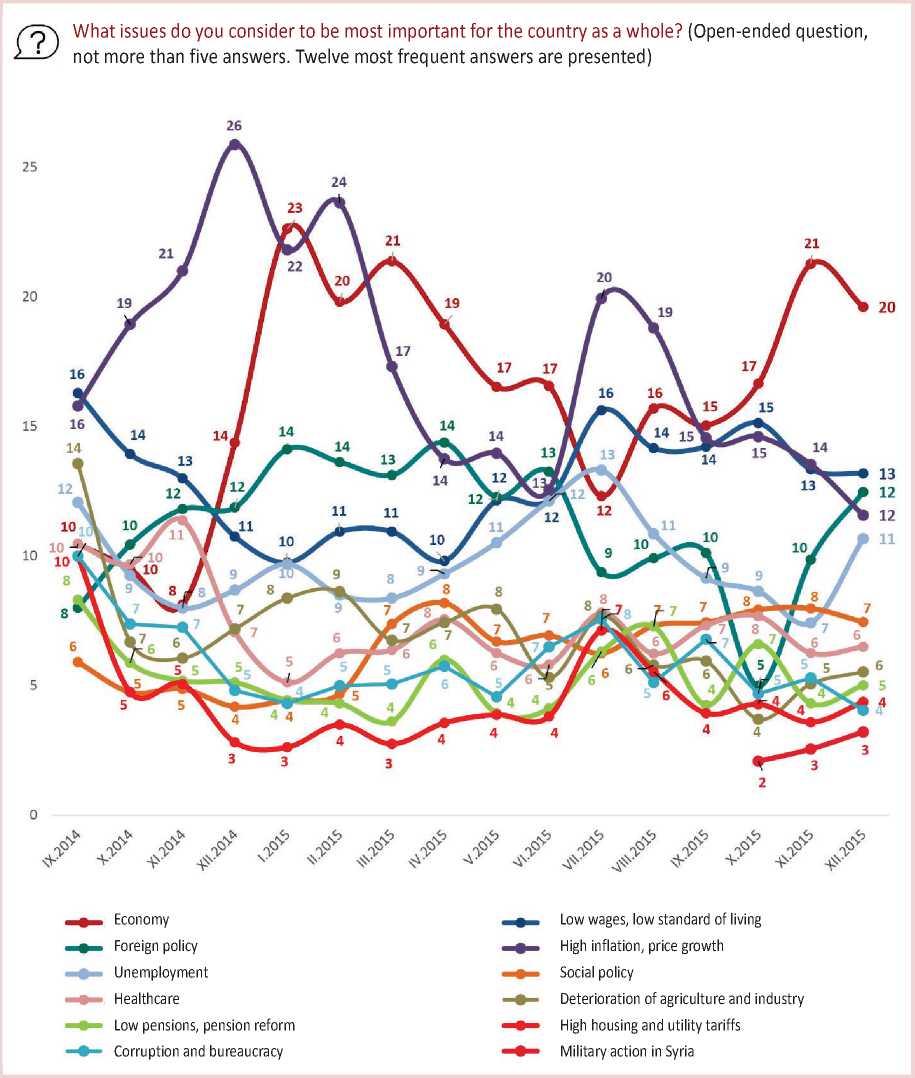
problems of Russia has grown from 10 to 20% in twelve months). The other two places in the top three issues of the rating are occupied by two related issues – low wages, low standard of living (13%), inflation, rising prices (12%). It should be pointed out that at that time the inflationary shock experienced in the spring of 2015 came to naught by December: the population adapted to the new level of prices and rate of inflation (during the year it reached almost 13%).
Another socio-economic problem – unemployment – ranks fourth with 11% of the respondents who feel concern about it. All the rest issues (political, social and others) became much less relevant to the residents of our country in 2015, but mostly not because of some positive changes in their decision, but in view of deteriorating socio-economic situation. It is this fact that pushed into the background those “advanced” concerns, typical for the “fat” years.
Map of fears
Another research tool used by VTsIOM, a “Map of fears” shows a slightly different placement of priorities by the Russians regarding their concerns for the near future. First place in the list is occupied by the fear
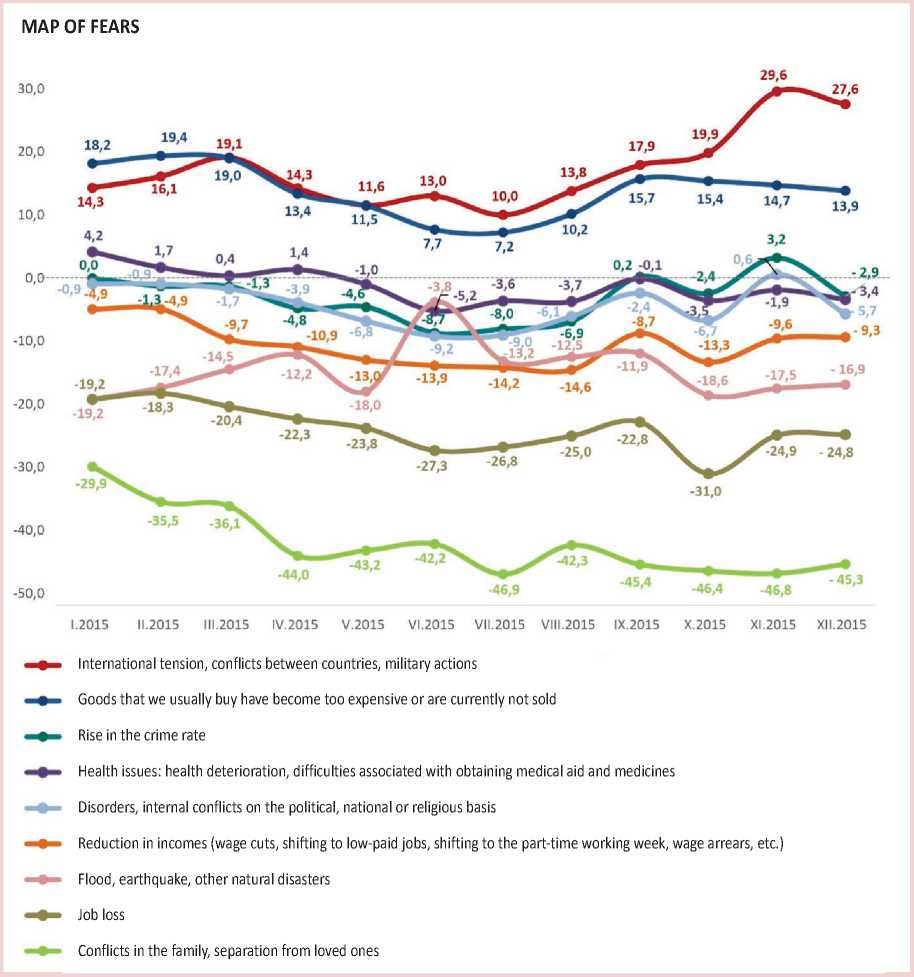
of rising international tension and conflicts, including military conflicts, between countries. This fear was consistently growing throughout the year (from 14 to 28 points), and the maximum point (30 points) was registered in November 2015 marked by the shootdown of a Sukhoi Su-24 bomber aircraft in the airspace of Syria by Turkish Air Forces. Fear of international conflicts that was decreasing along with the cessation of military clashes in the Donbass again grew after the Russian military aircraft started bombing Syria (late September) and peaked at the time when the conflict between Russia and Turkey was provoked by these circumstances.
Against such a dramatic background, an excessive fear of rising prices, which in January 2015 topped the ranking of Russians’ fears (18 points against 14 points for the fear of military conflicts), already moved to the second place by midyear, and, despite the high growth rate of inflation recorded by Rosstat (almost 13% in the course of the year) declined even more by December (to 14 points, i.e. twice less than the fear of military tension in the same month). We should point out that the Russians are concerned little with the loss of job (-19 points in January, -25 in December 2015) and decrease in income (-5 in January, -9 in December); this concern has not increased, but, on the contrary, decreased as the crisis is progressing. What is happening is due to the effect of the famous Maslow law, according to which as the primary needs (safety) come to the fore, the secondary needs (welfare) become less significant. And that is exactly what happens in the moment when experiencing economic difficulties the country is on the verge of war with a powerful neighbor (Turkey).
Another important indicator of the state of the Russian society is the dynamics of its emotional background. The VTsIOM assessments show that from March 2015 onwards the negative emotions experienced
Dynamics of emotional background, 2015
■ Negative emotions ■ Positive emotions

15 22 29 12 17 14 12 19 26 16 23 30 6 13 20 27 4 11 IS 25 1 3 15 22 29 6 13 20 27
Mar Mar Mar Apr May Jun Jul Jul Jul Aug Aug Aug Sep Sep Sep Sep Oct Oct Oct Oct Nov Nov Nov Nov Nov Dec Dec Dec Dec
The indicators were calculated on the basis of a color test developed by E. Dorofeeva. In this test, the sequence of the colors chosen by the respondent indicated his/her emotional state. Negative emotions comprise depression, anxiety, anger. Positive emotions include joy, benevolence, sorrow.
by our respondents consistently exceed the positive ones, and this “margin” to the end of the year reached 12%. The number of “optimists” who keep their spirits up in the face of an international confrontation while there exists a possibility of Russia entering a major war does not exceed 46%. Thus, the year 2015 marked by numerous domestic and external challenges was emotionally difficult, and its consequences are in store for next year.
From the Great Victory to the war in Syria
However, we can name at least one unifying and positive event that has received a huge response among the Russians and provided a great impetus to the consolidation of the Russian society under increasing difficulties. This event is the 70th Anniversary of the Victory in the Great Patriotic War 1941–1945; the anniversary is best remembered not only for its traditional military parade, but also for the “Immortal Regiment” march – an action unprecedented in the number of participants and emotional intensity when the Russians marched in Moscow along Red Square carrying portraits of their relatives who participated in the Great Patriotic War.
Ninety three percent of the Russians aged 18 and older (including 89% in the youngest group – aged 18–24) know what the “Immortal Regiment” is. This action г? In your opinion, what is the goal of the “Immortal Regiment” action? (Open-ended question, any number of answers is possible)
MEMORY (“the action is devoted to the memory of relatives who perished in the war”, “so that people remembered the Great Patriotic War”, “to show respect to the veterans and to remember them”, “so that we could remember our heroes”)
-
5 EDUCATION OF YOUNG PEOPLE (“for the purpose of educating the rising generation”, “to educate young people”, “young generation ought to know about those who perished in the war”, “so that our children knew the history of Russia”)
-
4 TO RAISE THE LEVEL OF PATRIOTISM (“patriotic education”, “for strengthening patriotism”, “to enhance patriotic
feelings”, “this is a patriotic movement”)
-
4 TO PAY TRIBUTE TO THOSE WHO PARTICIPATED IN THE WAR (“gratitude for the Victory”, “to do honor to the victors”,
“to pay tribute to victorious soldiers”, “honor and glory to our soldiers”)
-
2 TO UNITE PEOPLE (“to unite the people”, “for the cohesion of the people”, “to consolidate our society”, “it unites people”)
1 FOR VETERANS (“it pleases the veterans”, “to support the veterans”, “for the veterans”)
-
1 SO THAT THERE SHOULD BE NO MORE WAR (“to show the world that war is bad”, “so that there should be no more war,
that people should learn from mistakes”, “in order to prevent new wars”, “so that such thing should not be repeated”)
1 SO THAT HISTORY SHOULD NOT BE DISTORTED (“to support the historical truth”, “to show everyone that history cannot be rewritten”, “so that the whole world should know that the war was won by the Soviet Union”, “so that lies about this war should not be conceived”)
-
<1 TO RAISE OUR SPIRITS (“to keep up people’s morale”, “for raising the spirits of the Russians”, “support to the country, to the Russian spirit”, “in order to raise the spirits of the Russians”)
-
<1 TO DISTRACT PEOPLE FROM PROBLEMS (“to distract people from problems”, “to distract people from economic problems and made them love Putin”, “a cult is created and people are distracted from economic problems”, “to scramble people’s brains”)
4 OTHER (“power propaganda”, “to commemorate the 70th Anniversary of the Victory”, “to find relations”, “to write off money”) 12 I FIND IT DIFFICULT TO ANSWER
Го)This year, President Vladimir Putin participated in the “Immortal Regiment” action. Together with others, he marched along Red Square carrying a portrait of his father. What is your attitude toward Putin’s participation in this action? (Closed-ended question, one answer)
absolutely positive
sooner positive
sooner negative
absolutely negative

I find it difficult to answer
95 i
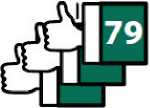

£7) Do you personally watch the Parade or not? (Closed-ended question, one answer)
Yes, I go to Red Square to watch the Parade
Yes, I watch a TV broadcast of the Parade
7I
!83i
No, I am not interested in this event
I find it difficult to answer
Age
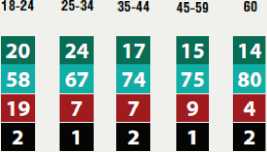
Type of settlement
Moscow and Million Major Medium
Towns Villages
St.Petersburg cities cities sized cities
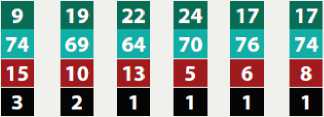
was assessed as positive by 96% of the respondents (including 81% of those who assessed it “definitely positively”). The proposal to make the “Immortal Regiment” march an important permanent part of the celebration of the great Victory was backed by 93%. Vladimir Putin’s personal participation in the march was approved by
95% of the respondents; this fact indicates a huge political success of those who initiated the “Immortal Regiment”, who managed to turn a mourning event into the demonstration of the unity of the Russian nation, the nation united not only by the memory of its victories and losses but also by its political leader.
|
© |
May 9, Moscow and other Russian cities will host the Victory Parade. In your opinion, what is the meaning of the Parade? (Open-ended question, any number of answers) |
||
|
— 2010 |
- 2015 ' |
||
|
31 |
47 |
7I |
SO AS NOT TO FORGET THE HISTORY OF THE COUNTRY, THE MEMORY OF THE PEOPLE’S HEROIC DEED (“memory”, “victory”, “celebration of the Victory”) |
|
20 |
15 |
Ы |
TO PAY TRIBUTE TO THOSE WHO PERISHED IN THE WAR, A SIGN OF GRATITUDE TO OUR ANCESTORS (“tribute to those who perished”, “express gratitude to those who perished”, “memory of those who fought in the war”) |
|
9 |
12 |
7! |
TO PLEASE THE VETERANS WHO SURVIVED, TO CONGRATULATE THEM (“to make the veterans happy”, “to pay tribute to the veterans”, “to congratulate the veterans”) |
|
18 |
12 |
Ы |
TO SHOW THE COUNTRY’S MILITARY POWER (“demonstration of the country’s military power”, “to demonstrate new weaponry”, “to show our strength to other countries”) |
|
11 |
11 |
TO CULTIVATE PATRIOTISM IN YOUNG PEOPLE, A WAY TO TELL THE HISTORY OF THE COUNTRY (“education of young people”, “growth of patriotism”, “to tell young people about the Great Victory”) |
|
|
- |
5 |
7I |
TO BE PROUD OF OUR COUNTRY AND OUR VICTORY (“pride”, “joy for the Victory”, “pride in our country and Victory”) |
|
8 |
3 |
^1 |
CONSOLIDATION OF THE PEOPLE, GENERATIONS, A REASON FOR BEING PROUD OF THE COUNTRY (“consolidation of generations”, “unity of the people”, “solidarity”) |
|
4 |
3 |
IT IS JUST A GOOD TRADITION (“tradition” “national holiday”, “70th Anniversary of the Victory”) |
|
|
2 |
1 |
A MEANINGLESS EVENT, A SHOW-OFF (“a show-off”, “nobody appreciates the veterans anymore”, “I see no point in this”) |
|
|
>1 |
1 |
OTHER |
|
|
15 |
12 |
I FIND IT DIFFICULT TO ANSWER |
|
The Russians tend to regard with skepticism the participation of political activists and political parties leaders in civil actions, seeing in it a desire of these people to “worm themselves into the trust of the public”, satisfy their own interests and obtain political benefits they have not earned. However, Vladimir Putin, participating in the “Immortal Regiment” march and carrying a portrait of his father, a Great Patriotic War veteran, was viewed quite naturally as “one of us” rather than as a stranger from the cynical world of politics.
A more familiar element in the celebration is a military parade on Red
Square aims to show the country and the world the might of the Russian army and its combat readiness and to confirm the ambitions of Russia as a great power. This feature of the parade is usually criticized by domestic pro-Western liberals, while proEurasian traditionalists, on the contrary, are proud of it. Polls show that the 2015 parade became the highest-rated event watched by nine out of every ten Russians (91% vs. 83% five years ago).
Still more important is the fact that the parade has not divided, but united our society due to the pride we take in our Armed Forces, respect we feel toward the
? Which of the statements is close to your point of view? (Closed-ended question, one answer)
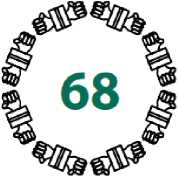
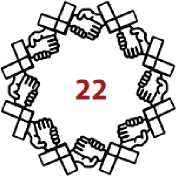

Russia MUST FIRMLY STAND ITS GROUND even if this can lead to deterioration of relations with Western countries
Russia must MAINTAIN
GOOD RELATIONS with Western countries, even if it has to make concessions in some issues
I FIND
IT DIFFICULT
TO ANSWER
<7> How do you assess President Putin’s decision to send Russian military air forces to Syria to fight against the terrorist organization “The Islamic State of Iraq and the Levant” (Closed-ended question, one answer)
SOONER SOONER
APPROVE DO NOT APPROVE
FULLY APPROVE


DEFINITELY DO NOT APPROVE
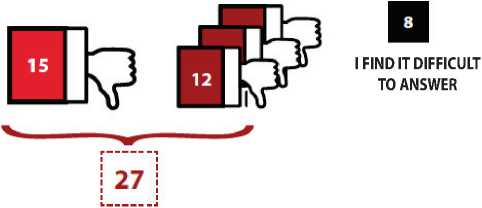
What kind of aid should be provided to Syria? (Closed-ended question, not more than three answers, % of those who think Russia should back one of the sides in the Syrian conflict)
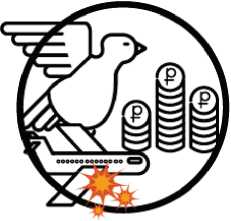
44 DIPLOMATIC
41 HUMANITARIAN, ECONOMIC
40 AID OF MILITARY AIR FORCES, AIR STRIKES
24 SUPPLYING ARMS AND AMMUNITION В
17 SENDING ADVISORS
5 AID OF THE ARMY (LAND OPERATION)
11 I FIND IT DIFFICULT TO ANSWER army and readiness to deal with geopolitical and military challenges. Given the fact that the confrontation with the West since, at least, the spring of 2014 has been the cornerstone of Putin’s policy, the parade and emotions the Russians felt in this connection definitely helped strengthen his authority and enhanced the support of his course of action. The emerging desire of the upper and lower classes of the Russian society to mitigate the negative consequences and reduce the intensity of heat in the confrontation with the West has not turned into a willingness to change the course radically, to stop supporting the Donbass, to return Crimea to Ukraine and to make far-reaching concessions to the West in other areas of the bilateral confrontation.
The number of supporters of new “turn to the West”, if it is a generalized concept, seems to be significant (22%), though it is three times less than the number of adherents of the previous course (68%). But when it comes to possible concrete concessions, it becomes apparent that neither concept gains even such level of support: only 3–5% or a maximum of 7% of the respondents are willing to return Crimea to Ukraine and stop supporting the Donbass and so on.
Thus, the depth of the crisis and the decline in the popularity of the regime are still far from the threshold at which the geopolitical positions are surrendered under the indifferent connivance of society.
In contrast to the period of 1989–1991, when Soviet people rather calmly observed the Soviet Union losing its influence in Eastern Europe and the world, the presentday Russians are determined to fight hard for the preservation of their country’s dominance in the Post-Soviet space in spite of any actions of the West.
In this context, it becomes clear why our society approves of Russia’s participation in the war in Syria: it is perceived as a proof of growing geopolitical power of Russia, the fact that makes other countries, especially the U.S., to reckon with it not just in this issue, but in other matters as well. The President’s decision to send military aircraft to Syria was supported by two-thirds of the respondents, and 27% were against this decision.
The “Afghan syndrome” that plagued our society in 1980–1990 is not yet found in the attitude of the Russians toward the aid to Syria, but there are several severe restrictions that President Putin must observe, if he does not want Russia’s participate in the Syrian war to undermine people’s trust in him. We are talking about the fact that Russian troops must not participate in ground operations of Bashar al-Assad’s army (only 5% of the Russians would approve of this measure). If these requirements are complied with, then the new war in the Middle East will not provide domestic critics of Putin with new serious arguments.
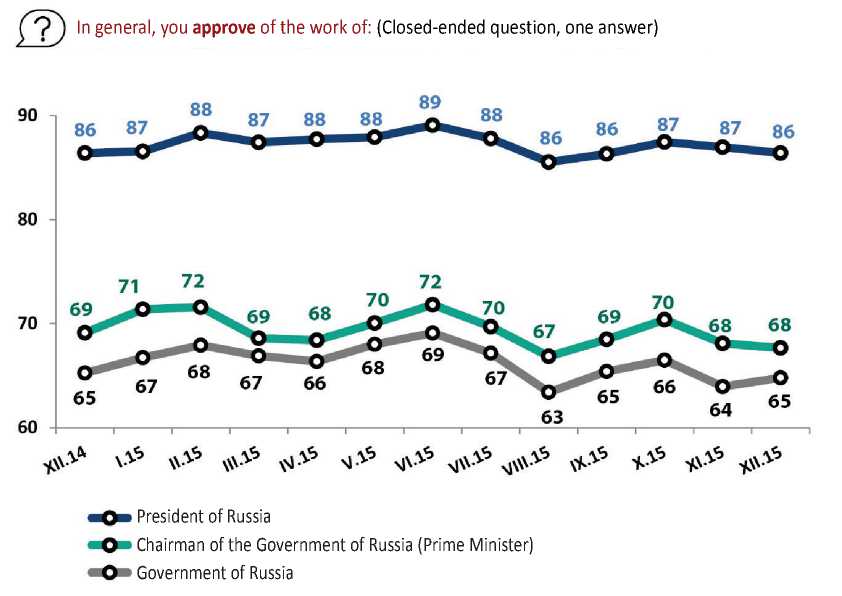
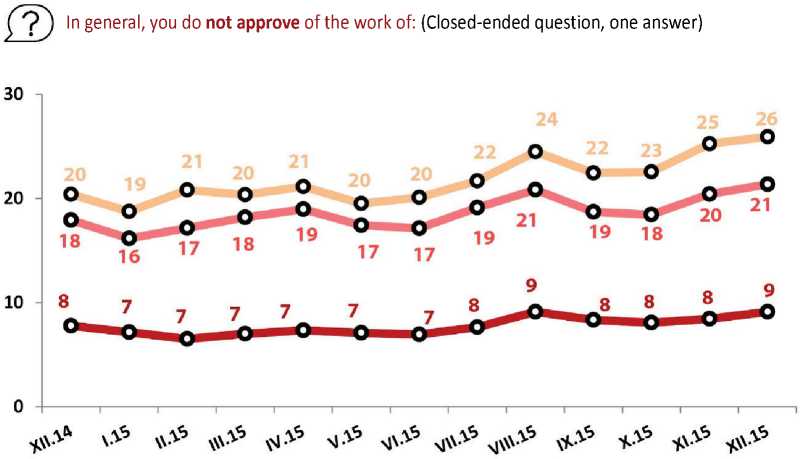
О President of Russia
Chairman of the Government of Russia (Prime Minister) о Government of Russia
Towards the 2016 elections
Economic crisis, confrontation with the West, Russia’s involvement in the new and dangerous conflict in the Middle East along with the unsettled situation in the Donbass – all these factors had a downward effect on the rating of President Putin and other key political institutions of his regime. However, this impact was mainly offset by Putin’s skillful policy, a significant stock of credibility he gained and support of the overwhelming majority of the Russians that he now possesses. The average level of approval of Putin’s work as head of state did not fall below 86% during the year, and the proportion of those who do not approve of his work remained at the level of 7–9%.
The level of approval of Prime Minster Dmitry Medvedev remains stable, although at a lower level and with somewhat greater fluctuation (67–72%); the same can be said about the Government in general (63-69%). The Prime Minister and the Cabinet continue to enjoy the protection of “the President’s umbrella” and Putin’s charisma, and the latter does not see the need to sacrifice the Cabinet in order to save his own position.
Nevertheless, the pressure points of the President’s course and Government policy were revealed throughout 2015, which creates a high probability of decline in the rating of the President, Prime Minister and Cabinet as the 2016 State Duma
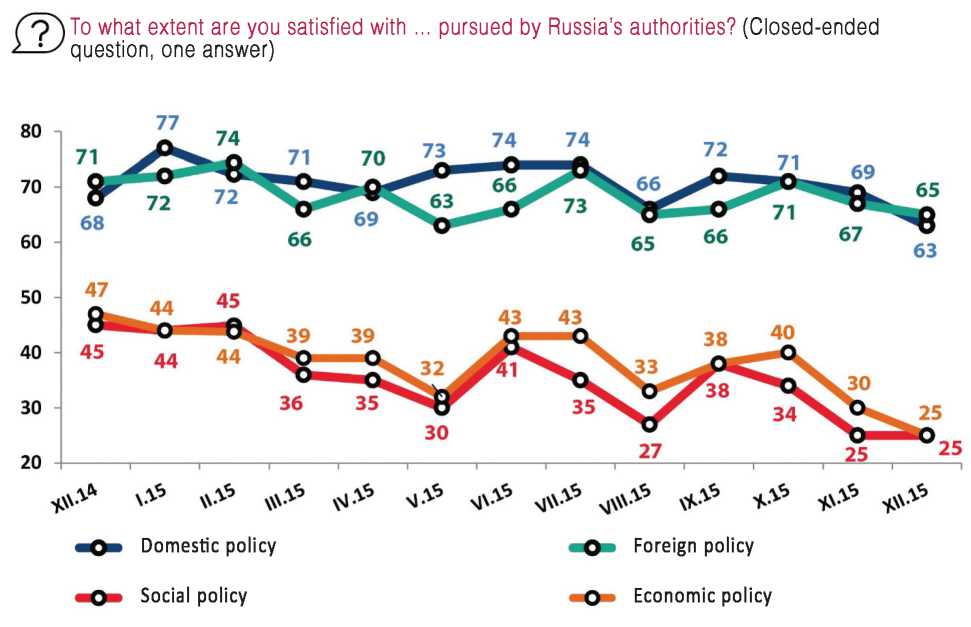
PARLIAMENTARY
If the State Duma election took place on the coming Sunday, then which of Russia’s political parties would you, most probably, vote for? (Closed-ended question, one answer)
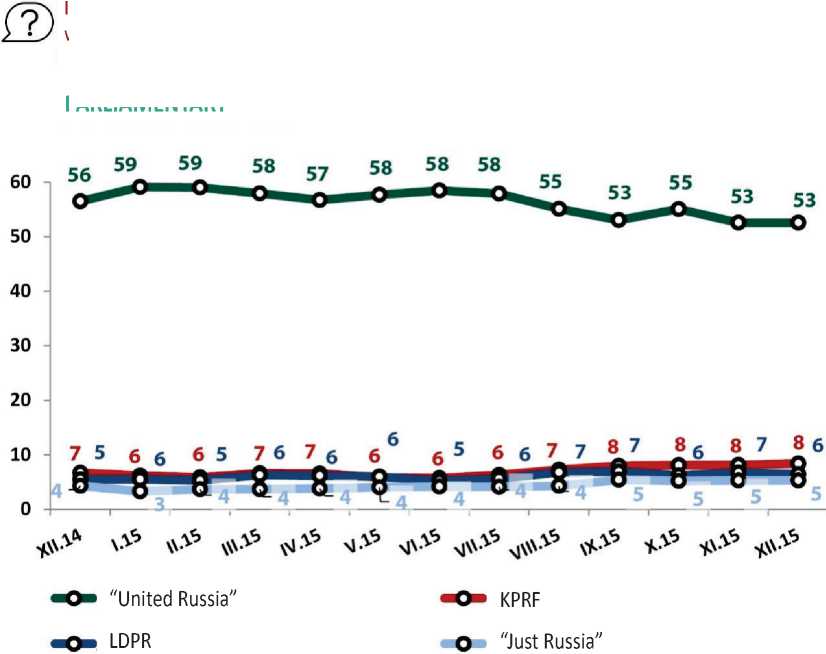
election campaign is deployed. Foreign and domestic policies as such are the most popular aspects of the regime, forming its “citadel”: the former was supported by 71% of the Russians in January 2015 (by 65% – in December), the latter by – 68% (by 63% –in December,). For the year, both aspects have lost part of their supporters, but continue are still approved by two-thirds of the Russians. The situation is much more serious with regard to economic policy (47% approved of it in January, 25% – in December) and social policy (45 and 25%, respectively) – these are the most weak and vulnerable points in the defense of the regime.
It is not the President, but the Government that is responsible for the economy and social sphere in Russia; and it has been announced that Prime Minister Medvedev will head the candidate list of the ruling party in the parliamentary elections of 2016. It turns out that Prime Minister, who is responsible for socio-economic setbacks of recent times, is intended to explain to his voters the reasons for current difficulties and inspire them to vote for “United Russia” again. Meanwhile, the proportion of people supporting this party was reducing as the “Crimean effect” declined and economic crisis became more profound: during the year, the number of those who planned to vote for this party dropped from 59 to 53% (mean monthly values).
And although the level of support for the opposition parties – both parliamentary and those not yet represented in the Duma – has not increased over the year; it is clear that they will benefit from the weakening of the “United Russia”. According to preliminary estimates, the ruling party is unlikely to improve its rating by September 2016 compared to the previous 2011 election (49%), and it may become even worse on the background of the unfolding crisis and coordinated attack that the opposition forces launch against the “United Russia”.
However, the general political stability is highly unlikely to be affected owing to three important factors. First, the number of deputy seats for the “United Russia” and its ally, the All-Russia People’s Front, may not reduce, but grow due to the fact that for the first time since 2007, deputies will be elected not only on the lists but also on the majoritarian districts (and here, the “ruling party” maintains a significant advantage). Second, the parliamentary opposition competes with the “United Russia”, but recognizes the unconditional leadership of Vladimir Putin, and under the current Constitution the powers of the State Duma are considerably limited and much inferior to presidential powers. Third, the “non-systemic opposition”, i.e. politicians who are firmly opposed to Putin will not have any serious voter support and are unlikely to obtain it by September 2016.
Hence, the Putin regime will pass the test of the election, despite the negative informational, emotional and economic background. At the same time, the incipient weakening of the “United Russia” in case it is fixed by the election results will force the regime to act more carefully, to maneuver, to enter into coalition with the parties of the systemic opposition, to update the composition of the Government and to adjust its policy in certain aspects so that it would be ready for the 2018 presidential election and ensure Putin’s re-election to a new six-year term.

